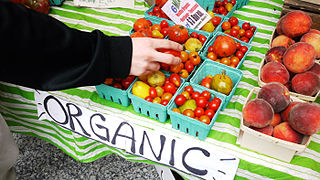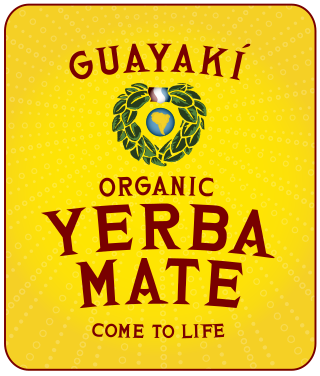Related Research Articles
Islamic dietary laws are laws that Muslims follow in their diet. Islamic jurisprudence specifies which foods are halāl and which are harām. The dietary laws are found in the Quran, the holy book of Islam, as well as in collections of traditions attributed to Islamic prophet Muhammad ("Sunnah").

The Paleolithic diet, Paleo diet, caveman diet, or stone-age diet is a modern fad diet consisting of foods thought by its proponents to mirror those eaten by humans during the Paleolithic era.

The organic movement broadly refers to the organizations and individuals involved worldwide in the promotion of organic food and other organic products. It started during the first half of the 20th century, when modern large-scale agricultural practices began to appear.

Organic certification is a certification process for producers of organic food and other organic agricultural products, in the European Union more commonly known as ecological or biological products. In general, any business directly involved in food production can be certified, including seed suppliers, farmers, food processors, retailers and restaurants. A lesser known counterpart is certification for organic textiles that includes certification of textile products made from organically grown fibres.

Halal is an Arabic word that translates to 'permissible' in English. In the Quran, the term halal is contrasted with the term haram. This binary opposition was elaborated into a more complex classification known as "the five decisions": mandatory, recommended, neutral, reprehensible and forbidden. Islamic jurists disagree on whether the term halal covers the first two or the first four of these categories. In recent times, Islamic movements seeking to mobilize the masses and authors writing for a popular audience have emphasized the simpler distinction of halal and haram.

Raw foodism, also known as rawism or a raw food diet, is the dietary practice of eating only or mostly food that is uncooked and unprocessed. Depending on the philosophy, or type of lifestyle and results desired, raw food diets may include a selection of fruits, vegetables, nuts, seeds, eggs, fish, meat, and dairy products. The diet may also include simply processed foods, such as various types of sprouted seeds, cheese, and fermented foods such as yogurts, kefir, kombucha, or sauerkraut, but generally not foods that have been pasteurized, homogenized, or produced with the use of synthetic pesticides, fertilizers, solvents, and food additives.
The tooth-friendly label distinguishes products which are non-cariogenic and non-erosive, i.e. safe for teeth. To replace sugar, toothfriendly products often contain sweeteners that are not fermented by the microflora of the dental plaque. Products that are certified as toothfriendly also do not contain excessive amounts of food acids.

The Rainforest Alliance is an international non-governmental organization (NGO) with staff in more than 20 countries and operations in more than 70 countries. It was founded in 1987 by Daniel Katz, an American environmental activist, who serves as the chair of the board of directors. The NGO states that its mission is “to create a more sustainable world by using social and market forces to protect nature and improve the lives of farmers and forest communities.” Its work includes the provision of an environmental certification for sustainability in agriculture. In parallel to its certification program, the Rainforest Alliance develops and implements long-term conservation and community development programs in a number of critically important tropical landscapes where commodity production threatens ecosystem health and the well-being of rural communities.
The Academy of Nutrition and Dietetics is a 501(c)(6) trade association in the United States. With over 112,000 members, the association claims to be the largest organization of food and nutrition professionals. It has registered dietitian nutritionists (RDNs), nutrition and dietetics technicians registered (NDTRs), and other dietetics professionals as members. Founded in 1917 as the American Dietetic Association, the organization officially changed its name to the Academy of Nutrition and Dietetics in 2012. According to the group's website, about 65% of its members are RDNs, and another 2% are NDTRs. The group's primary activities include providing testimony at hearings, lobbying the United States Congress and other governmental bodies, commenting on proposed regulations, and publishing statements on various topics pertaining to food and nutrition.

Organic food, ecological food, or biological food are foods and drinks produced by methods complying with the standards of organic farming. Standards vary worldwide, but organic farming features practices that cycle resources, promote ecological balance, and conserve biodiversity. Organizations regulating organic products may restrict the use of certain pesticides and fertilizers in the farming methods used to produce such products. Organic foods are typically not processed using irradiation, industrial solvents, or synthetic food additives.

NSF is a product testing, inspection, certification organization with headquarters in Ann Arbor, Michigan. NSF also offers consulting and training services worldwide.

The Vegan Awareness Foundation, also known as Vegan Action, is a 501(c)(3) non-profit organization in Virginia, United States, and founded in 1995. Its declared goal is to help animals, the environment, and human health by educating the public about the benefits of a vegan lifestyle and encourage the spread of vegan food options through public outreach campaigns. One of the goals of Vegan Action is to create growth in the vegan marketplace and increase the availability of vegan products. They have introduced a logo to certify vegan products, vegan food options into schools nationwide, and ideas behind veganism.

Fair trade cocoa is an agricultural product harvested from a cocoa tree using a certified process which is followed by cocoa farmers, buyers, and chocolate manufacturers, and is designed to create sustainable incomes for farmers and their families. Companies that use fair trade certified cocoa to create products can advertise that they are contributing to social, economic, and environmental sustainability in agriculture.
A kosher certification agency is an organization or certifying authority that grants a hechsher to ingredients, packaged foods, beverages, and certain materials, as well as food-service providers and facilities in which kosher food is prepared or served. This certification verifies that the ingredients, production process including all machinery, and/or food-service process complies with the standards of kashrut as stipulated in the Shulchan Arukh, the benchmark of religious Jewish law. The certification agency employs mashgichim to make periodic site visits and oversee the food-production or food-service process in order to verify ongoing compliance. Each agency has its own trademarked symbol that it allows manufacturers and food-service providers to display on their products or in-store certificates; use of this symbol can be revoked for non-compliance. Each agency typically has a "certifying rabbi" who determines the exact kashrut standards to be applied and oversees their implementation.

Guayakí Sustainable Rainforest Products, Inc., more commonly known as Guayakí, is an organic beverage company specializing in yerba mate products based in Sebastopol, California. In addition to offering loose-leaf yerba mate, Guayakí also sells canned as well as carbonated yerba mate drinks, and energy shots. Guayakí receives American-nationwide distribution to approximately 10,000 stores, primarily through organic and health-oriented grocery stores such as Whole Foods among other retailers, as well as through online channels.
Sunbasket is a subscription meal delivery service that ships members fresh, sometimes organic, and sustainable ingredients and recipes every week, allowing them to cook their own meals. The company is headquartered in San Francisco, and operates two regional distribution centers in Morgan Hill, CA and Westampton, New Jersey. It is part of the meal kit industry.

Thrive Market is an American e-commerce membership-based retailer offering natural and organic food products. It was founded by Nick Green, Gunnar Lovelace, Kate Mulling, and Sasha Siddhartha. By 2016 they had raised $141 million across three rounds of funding following their launch in November 2014.
Rip Van is an American food company that currently manufactures stroopwafels, keto wafers, Keto cookies, Fruit Bars, fruit snacks and other keto snacks in the United States. The company manufactured stropwafels which are two thin waffle pastries melded together with a sweet syrup center, aka a syrup waffle.
William John Bulsiewicz better known as Dr. B., is an American board-certified gastroenterologist and author known for his exploration of the relationship between the gut microbiome and plant-based nutrition.
References
- ↑ "CERTIFIED P PALEO Trademark of Pendergrass, Karen - Registration Number 4767643 - Serial Number 86406733 :: Justia Trademarks". trademarks.justia.com. Retrieved May 15, 2020.
- ↑ "Should there be a Paleo certification label?". New Hope Network. November 11, 2013. Retrieved May 16, 2020.
- ↑ Gordon, Maggie (October 7, 2014). "Greenwich company hits Whole Foods Market with paleo-diet friendly ice pops". GreenwichTime. Retrieved May 14, 2020.
- ↑ GmbH, finanzen net. "Tastefully Plated Launches New Paleo Friendly Certified Meals | Markets Insider". markets.businessinsider.com. Retrieved May 14, 2020.
- ↑ foodnavigator-usa.com (6 January 2016). "EPIC Provisions sells to General Mills: 'We felt like we couldn't walk away from this opportunity'". foodnavigator-usa.com. Retrieved May 14, 2020.
- ↑ "Why 'Keto-Approved' Food Labels are Misleading, According to a Nutritionist". Health.com. Retrieved May 14, 2020.
- ↑ "Keto credentials: Show consumers your product is authentic". New Hope Network. February 5, 2020. Retrieved May 14, 2020.
- ↑ "Continued popularity of keto diet fuels product development". Natural Products INSIDER. March 30, 2020. Retrieved May 14, 2020.
- ↑ "22 Best Keto Snacks to Buy For Fat Loss". www.msn.com. Retrieved 2020-07-23.
- ↑ Castrodale, Jelisa (2020-01-09). "Archaelogical Find Suggests That Actual Paleo Diet Included Lots of Carbs". Vice. Retrieved 2023-05-25.
- ↑ Leiva, Courtney. "What The Hell Is Paleo Skin Care?". www.refinery29.com. Retrieved 2023-05-25.
- ↑ foodnavigator-usa.com (29 November 2016). "Paleo certification requests have doubled annually, scheme embraced by 'household names,' says Paleo Foundation". foodnavigator-usa.com. Retrieved May 14, 2020.
- ↑ foodnavigator-usa.com (29 November 2016). "Paleo certification requests have doubled annually, scheme embraced by 'household names,' says Paleo Foundation". foodnavigator-usa.com. Retrieved May 14, 2020.
- ↑ "Is Paleo the New Black?". Food Liability Law. April 11, 2015. Retrieved May 14, 2020.